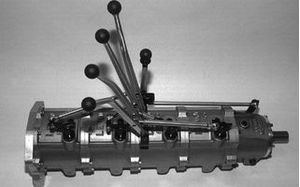Ricardo Transmissions in Endurance Racing
The 24 Hours of Le Mans is the world's oldest
active sports car race in endurance racing, organized on an annual basis since
1923 near the town of Le Mans, France. It is considered as top of the range
auto racing competitions around the globe and has been named the "Grand
Prix of Endurance and Efficiency".
Unlike fixed distance races where the winner is
determined by minimum time, the 24-Hours of Le Mans awards a win to the car
that covers the greatest distance in 24 hours. Racing teams have to find a
balance between the speed and reliability of cars, which must last for 24 hours
without mechanical failures.
All teams have at least three pilots, and each of them can drive up to 4 hours in a row until he is replaced by his teammate. While each driver has a chance to take a break during the race, the powertrain components of the car, namely the transmission unit, cannot afford the same luxury. Operating under extreme conditions, transmissions installed in Le Mans racing cars still have to timely deliver the necessary amount of torque to the wheels to increase the team's chances of winning. To put it simply, the transmission must be durable and Ricardo knows for sure how to achieve this goal.
Ricardo is well-known for its expertise in
providing highly-efficient and winning transmission solutions for GT customers.
With a proven record of manufacturing transmissions for racing applications for
several decades, and almost 60 years of R&D in almost every racing segment,
implying that the company has a solid experience to rely on. Each time when
there are changes in technical regulations related to transmissions, Ricardo
always finds a way to design an efficient solution.
Learn more about performance products provided by Ricardo
Nowadays, the company provides its transmission
units not only to the teams competing in different classes of Le Mans racing,
but also for WRC, Formula E, Porsche Supercup, etc. Moreover, it should be
mentioned that many cars equipped with Ricardo transmissions achieved a lot of
success in endurance racing competitions (Le Mans and 24 Hours of
Spa-Franchorchamps).
Ricardo cooperates with major automakers and part suppliers involved in racing competitions. When it comes to provide transmissions to GT3 and GTE teams, Ricardo collaborates with teams of different levels: from leading teams to less well-sponsored squads. Ricardo engineers certainly know what it takes to provide a variety of transmissions for different racing classes, which have to meet different technical regulations. In practice, transmissions are adjusted to specific powertrains, all of which have well-defined power and torque requirements, but Ricardo is notable for its competence in effective cooperation with its customers and development of quality solutions which fully conform to client's demands.
Learn more about Ricardo’s achievements in motorsports
Ricardo has a team of professionals specialized in racing technologies, who will thoroughly analyze the customer’s necessities, as well as technical peculiarities of components that usually affect the transmission design, discuss possible improvements, and then develop the optimal solution. They'll also give comprehensive consideration to all the parts that the customer desires to include onto the transmission housing, then Ricardo experts will produce a conceptual design with the help of their workmanship and back and a variety of available technologies to set up the most efficient transmission pack prior to reviewing that with the customer and manufacturing prototypes.
All developed transmissions designed by Ricardo engineers are exposed to rigorous testing in order to optimize the design before starting the production batch. It is quite a time-consuming process, but Ricardo puts a priority on quality. Steven Blevins, Ricardo’s project manager, who has been with the company for almost two decades, is the head of the transmission production team.

Steven Blevins
According to Mr. Blevins, his team does its
best to collaborate with Ricardo customers in the most efficient manner. The
thing is that production processes for racing competitions significantly differ
from processes applied for manufacturing of conventional road cars, as Ricardo
customers from racing competitions come with a strictly fixed timeframe.
Therefore, providing the quality product on a timely basis becomes a key
priority for Ricardo engineers.
But when the transmission unit leaves the production line Ricardo’s mission doesn’t end there as the company continues to support its clients and partners throughout the whole period of the transmission's lifecycle. For instance, such type of racing as historic racing implies the competition of classic cars equipped with original components (in good operating conditions). Mr. Blevins says that they still receive enquiries on transmission units released in the 1990s. Moreover, now the company plans to remanufacture some Peugeot 908 Le Mans transmission parts, as those elements are in high demand in historic racing teams.

Ricardo’s transmission parts are known not only
for their high-quality and durability, but also for operational flexibility.
Despite the fact that Ricardo engineers design transmissions for a variety of
GT projects (which have their own peculiarities), all solutions come from the
same time-proven family of components. For instance, if you have a closer look
at transverse and longitudinal solutions, it is possible to notice a lot of
similarities. Thus, the company manages to save time and resources during the
development process. Ricardo engineers just take standard components and modify
them in accordance with customer’s requirements.
The same level of flexibility is also applied to the production process, as Ricardo completes small-scale as well as larger-scale orders. For example, for GTE projects it may be necessary to produce 10-12 transmissions per year, while some large-volume contracts imply hundreds of units delivered every year. For large-scale project, where it is necessary to produce several hundred gearboxes annually, Ricardo sets up a special production system which includes an assembly line exclusively for that project.








